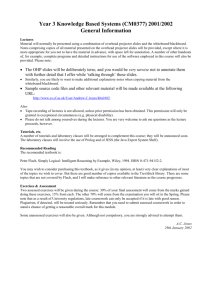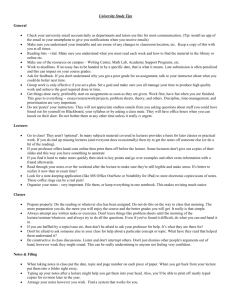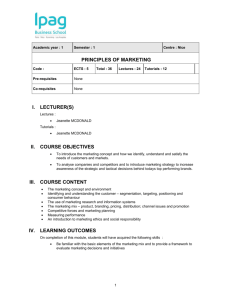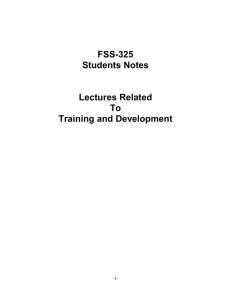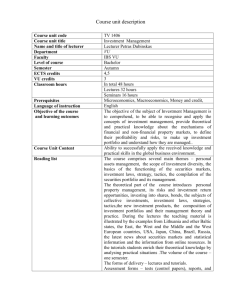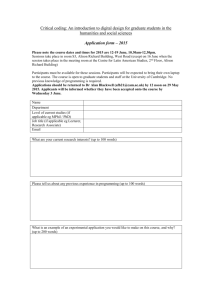CI9-B4 Business Environments and Construction Law
advertisement
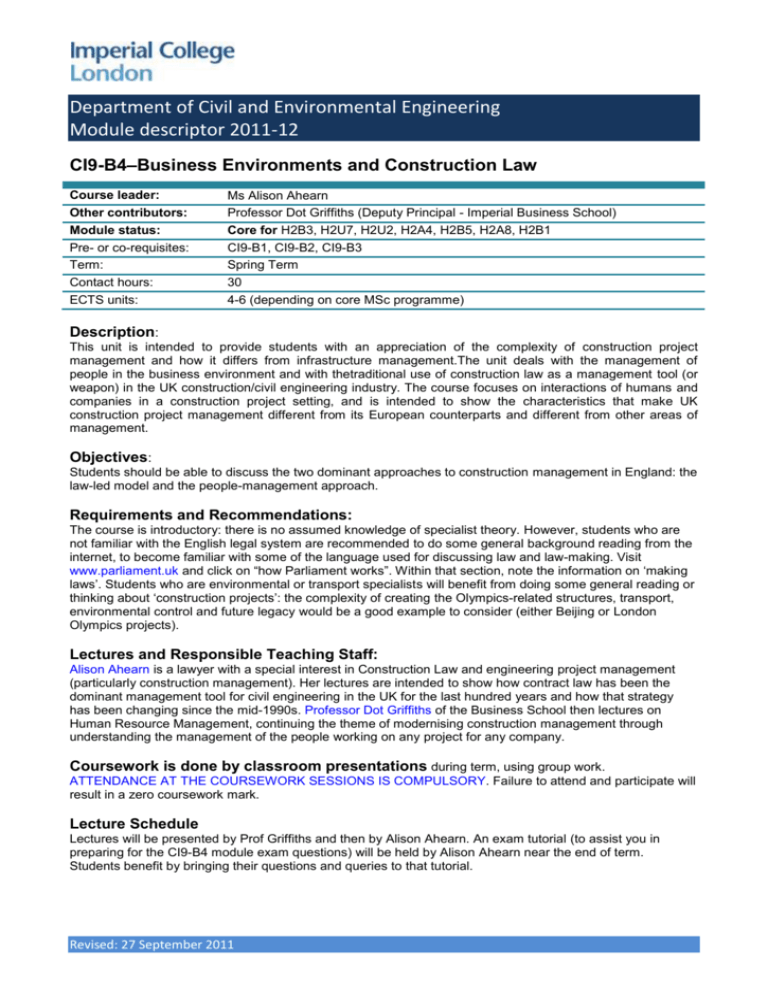
Department of Civil and Environmental Engineering Module descriptor 2011-12 CI9-B4–Business Environments and Construction Law Course leader: Other contributors: Module status: Pre- or co-requisites: Term: Contact hours: ECTS units: Ms Alison Ahearn Professor Dot Griffiths (Deputy Principal - Imperial Business School) Core for H2B3, H2U7, H2U2, H2A4, H2B5, H2A8, H2B1 CI9-B1, CI9-B2, CI9-B3 Spring Term 30 4-6 (depending on core MSc programme) Description: This unit is intended to provide students with an appreciation of the complexity of construction project management and how it differs from infrastructure management.The unit deals with the management of people in the business environment and with thetraditional use of construction law as a management tool (or weapon) in the UK construction/civil engineering industry. The course focuses on interactions of humans and companies in a construction project setting, and is intended to show the characteristics that make UK construction project management different from its European counterparts and different from other areas of management. Objectives: Students should be able to discuss the two dominant approaches to construction management in England: the law-led model and the people-management approach. Requirements and Recommendations: The course is introductory: there is no assumed knowledge of specialist theory. However, students who are not familiar with the English legal system are recommended to do some general background reading from the internet, to become familiar with some of the language used for discussing law and law-making. Visit www.parliament.uk and click on “how Parliament works”. Within that section, note the information on ‘making laws’. Students who are environmental or transport specialists will benefit from doing some general reading or thinking about ‘construction projects’: the complexity of creating the Olympics-related structures, transport, environmental control and future legacy would be a good example to consider (either Beijing or London Olympics projects). Lectures and Responsible Teaching Staff: Alison Ahearn is a lawyer with a special interest in Construction Law and engineering project management (particularly construction management). Her lectures are intended to show how contract law has been the dominant management tool for civil engineering in the UK for the last hundred years and how that strategy has been changing since the mid-1990s. Professor Dot Griffiths of the Business School then lectures on Human Resource Management, continuing the theme of modernising construction management through understanding the management of the people working on any project for any company. Coursework is done by classroom presentations during term, using group work. ATTENDANCE AT THE COURSEWORK SESSIONS IS COMPULSORY. Failure to attend and participate will result in a zero coursework mark. Lecture Schedule Lectures will be presented by Prof Griffiths and then by Alison Ahearn. An exam tutorial (to assist you in preparing for the CI9-B4 module exam questions) will be held by Alison Ahearn near the end of term. Students benefit by bringing their questions and queries to that tutorial. Revised: 27 September 2011 Department of Civil and Environmental Engineering Module descriptor 2011-12 Tutorials and other Activities: The lectures are mixed with interactive work or discussion work, so that the only formal “tutorials” are revision tutorials at the end of term to aid students in their preparation for the examination. Required text: The course focuses on material delivered in the classroom and fosters student discussion. There is no single required text. Many legal resources are available on the internet for free and students are encouraged to use these. The discussions in the classroom are central to students’ understanding and students are expected to take notes in class. For general insight, students may visit the website for Constructing Excellence http://www.constructingexcellence.org.uk/ Assessment and weighting for each unit is as follows: B4 – Business Environments & Construction Law Examination: Rubric Weighting Coursework: Weighting Two thirds of one two-hour paper undertaken in April/May Answer both questions 90% In-class individual assessment 10% Revised: 27 September 2011
